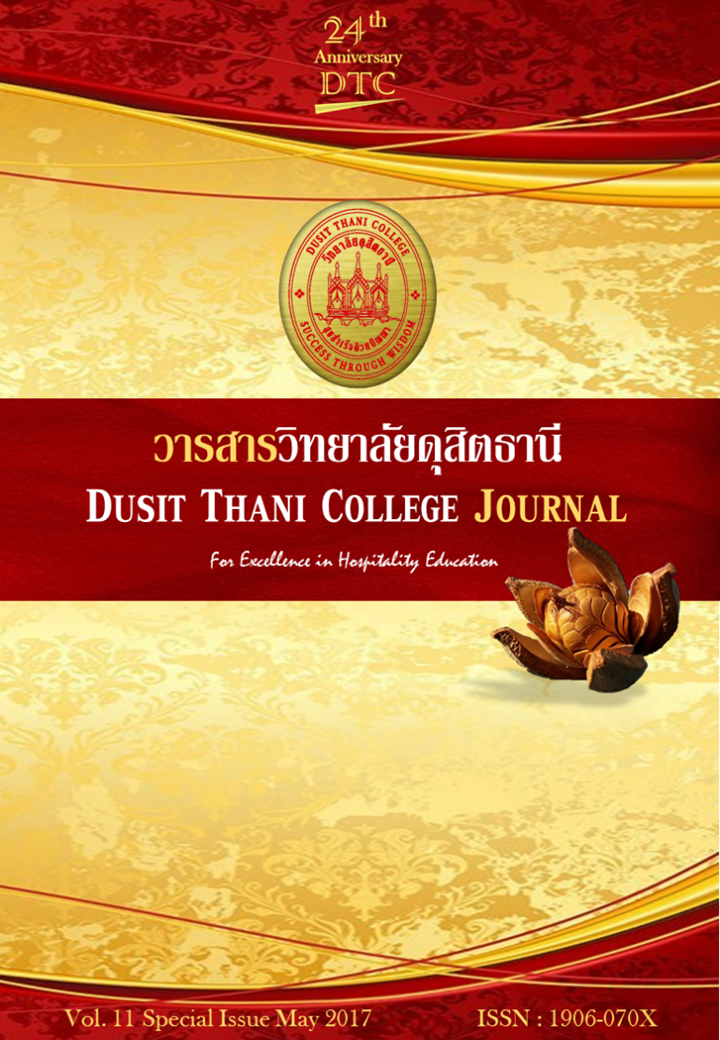The Guidelines for the Service Marketing Development of Hotels in BenchaBurapaSuwannabhum Cluster
Main Article Content
Abstract
The objectives of the research were: (1) to study tourists and hotel entrepreneur’s opinions throughout the service marketing mix for hotel business development. ; (2) to study the guideline for the service marketing development of hotels in BenchaBurapaSuwannabhum cluster. This study is the mixed method research based on data obtained through interviews and questionnaires. The sample groups of this research were divided into qualitative and quantitative methods. The population of this research comprise of 302 hotel entrepreneurs in BenjaBurapaSuvarnabhumi cluster and 3,825,470 tourists who travel into 5 provinces of BenjaBurapaSuvarnabhumi cluster. The sampling populations in quantitative research are 170 people of hotel entrepreneurs in BenjaBurapaSuvarnabhumi cluster, the researcher random selection by proportional stratified random method. And the tourists who travel into BenjaBurapaSuvarnabhumi cluster in total of 2,000 people and random selection by stratified sampling in an equal allocation method from each province for 400 people. The sampling populations in qualitative research are the hotel entrepreneurs in BenjaBurapaSuvarnabhum cluster selected totally 20 people,the researcher random selection by purposive sampling method.
The researcher used interview forms for hotel entrepreneurs, the questionnaires were used in order to collect the data from tourists and hotel entrepreneurs. The quantitative method was conducted by distributing 2,000 sets of questionnaires to the tourists and 170 sets of questionnaires to the hotel entrepreneurs. The qualitative method was conducted by interviewing hotel entrepreneurs in total 20 samples. The statistics used in the data analysis are frequency distribution, percentage, mean, standard deviation, exploratory factor analysis, confirmatory factor analysis and content analysis.
The outcome of qualitative research revealed that: the most significance factors of the service marketing mix for the hotel business development were people, products, prices and promotions. The outcome of quantitative research revealed that: the most requirements of the hotel entrepreneurs through the service marketing development are products, people and processes. While, the most requirement of the service marketing development from tourists are prices, products and processes. The guidelines of the service marketing for hotel business development in BenchaBurapaSuwannabhum cluster was consisted of empirical data by c2 = 11.274, df = 9, p = .257, c2/df = 1.253,GFI = 0.997, AGFI = 0.990, CFI = 0.999, NFI = 0.997, RMSEA = 0.016 and RMR = 0.003. The factor that had significant factor loading were 1) Personal development, 2) product and price development 3) Sales promotion development 4) Amenities development, 5) Process development 6) Channel of distribution development and 7) Service development respectively.
Article Details
Article Screening Policy
- All research and academic articles to be published must be considered and screened by three peer reviews in the relevant field / article.
- All articles, texts, illustrations and tables published in the journal are the personal opinions of the authors. Editors don't always have to agree. And no responsibility whatsoever is the sole responsibility of the author.
- The articles to be published must never be published. Where did you first publish? And not in the consideration of other journals If the audit found that there has been a duplicate publication It is the sole responsibility of the author.
- Any article that the reader sees as being plagiarized or impersonated without reference. Or mislead the work of the author Please let the journal editor know it will be your greatest blessing.
References
Christopher, H. Lovelock &J ochen, Wirtz (2004). Services marketing people, technology, strategy.5th Ed. United States of America: Prentice Hall International.
Diana, Luck. & Geoff, Lancaster. (2003). E-CRM: customer relationship marketing in the hotel industry. Managerial Auditing Journal, 18(3): 213 - 231.
Fangsom, Thanyapornnapas. (2013). Guideline for Marketing Development of 4-Star Hotels for Thai Hotel Local Chain in Pattaya City. Journal of Thai Hospitality and Tourism, 8(1): 49-60.
Kaosa-ard, Mingsarn., Kluafoo, Nukul&Untong Akarapong. (2005). Thailand hotel industry. Chiang Mai: Social research institute, Chiang Mai University.
Karnsawai, Fontip., Pooncharoen, Nattachet & Chamornmarn, Wai. (2012). The Study of Successful Characteristics of Hotel Business Entrepreneurs in the Lower Northern Provinces of Thailand.MIS Journal of Naresuan University, 7(1): 39-50.
Kunarucks, Taksina. (2003). Marketing and purchasing decisions of tourists. Chiang Mai: Chiang Mai University.
Lawrence, S. Meyers, Glenn, C., Gams t& Anthony J. Guarino. (2006). Applied Multivariate Research: Design and Interpretation.CA: Sage Publication, Inc.
Maraphot, Khanchit & Roonpraphan, Chutima. (2014). The Guideline of the Sustainable Development in the Potential of Agro-tourism in BenjaBurapaSuvarnabhum Cluster, Thailand. Chachoengsao: RajabhatRajanagarindra University.
Mohamed, Essawy. (2011). Egyptian hotel marketing managers’ perceptions of the Internet’s impact on marketing. Tourism and Hospitality Research, 11(3): 207-216.
Philip, Kotler., John, Bowen & James, Makens. (1999). Marketing forhospitality and tourism. 2nd Ed. United States of America: Prentice Hall International.
Pongsataporn, Somwong. (2007). The Secret of Service Marketing. Bangkok :SE-EDUCATION.
Prayotamornkul, Ponlarp & Nguanphan, Sasithorn. (2014). Factors that Effect on Customer Satisfaction towards Service of Holiday Inn Resort Phuket. Finance, Investment, Marketing and Business Management, 4(2): 309-332.
Revenue department. (2016). Hotel entrepreneurs list. Retrieved February, 10, 2016, from: http://www.rd.go.th/publish/44132.0.html.
Rex, B. Kline. (2011). Principles and Practice of Structural Equation Modeling. 3rd Ed. NY: Guilford Publications, Inc.
Sangpikul, Aswin. (2013). Research Methodology for Tourism and Hospitality. Bangkok: Dhurakij Pundit University Press.
Sukapong, Sujin. (2011). Managing Service Marketing for Boutique Hotels in Bangkok: Case Study of Metrosexual Men. Sripatum Review of Humanities and Social Sciences, 11(1) : 21-25
The Office of Strategy Management: Mid Central Provincial Cluster. (2016). The general condition of the Mid Central Provincial Cluster. Retrieved March, 17, 2016, from: http://www.osmcentral.moi.go.th.
Tourism Authority of Thailand. (2014). Compass travel. First issue. October – December 2014.
_______. (2014). Statistics of domestic tourists (province).Retrieved July, 23, 2014, from: http://marketingdatabase.tat.or.th.
_______. (2016). Statistics of domestic tourists (province).Retrieved February, 10, 2016, from: http://marketingdatabase.tat.or.th.
Vanichbuncha, Kanlaya. (2005). Statistics for research. Bangkok: Chula Press.
William, Gemmell Cochran. (1997). Sampling Techniques. 3rd Ed. New York: John Wiley & Sons.
Wongrattana, Chusri. (2010). Statistical Techniques for Research. 12th Ed. Bangkok: Taineramitkij Inter Progressive Press.


